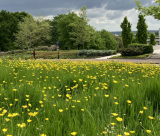Scientists leading £1.3m project
February 14th, 2012
Scientists at The University of Nottingham are leading a £1.3 million research project to develop new treatments to replace brain cells lost during dementia.
Lead investigator Dr Virginie Sottile, of the School of Clinical Sciences, is heading up the Alzheimer’s Society-funded study to ‘flick a genetic switch’ to turn bone marrow stem cells into brain cells.
Dr Sottile said, “This project will be a step towards stem cell therapies, altering human bone marrow stem cells to resemble brain stem cells by ‘switching on’ specific genes.
“Bone marrow contains a fraction of stem cells that are promising in terms of new therapies. These stem cells are already used to repair bone and cartilage. The research is a fundamental project to understand whether and how we can manipulate bone marrow cells to use as a source to replace lost brain cells.”
Stem cells have the potential to turn into many different cell types that the body needs, offering an opportunity to treat diseases where tissue has been damaged.
Alzheimer’s disease causes nerve cells to die, interrupting complex inter-connections in the cortex, the outer layer of the brain. It is this network of cells that gives us our memories, personalities and behaviour patterns.
Alzheimer’s Society Research Manager Dr Anne Corbett said: “Understanding how brain stem cells are produced is a further step towards knowing more about how the brain works and could, potentially, be repaired.
“We are still a long way off from a stem cell treatment for dementia but research like this is vital if we are to move forwards. Dementia research is drastically underfunded. We must invest now to develop new treatments and search for a cure.”
Find out more about the University’s Impact Campaign and how you can support dementia/Alzheimer’s research at: http://tiny.cc/UoNImpactdementia.
Leave a Reply
Other

May is for wild flowers and hedgehogs
This year the university is once again leaving some of our green spaces to grow wild […]



